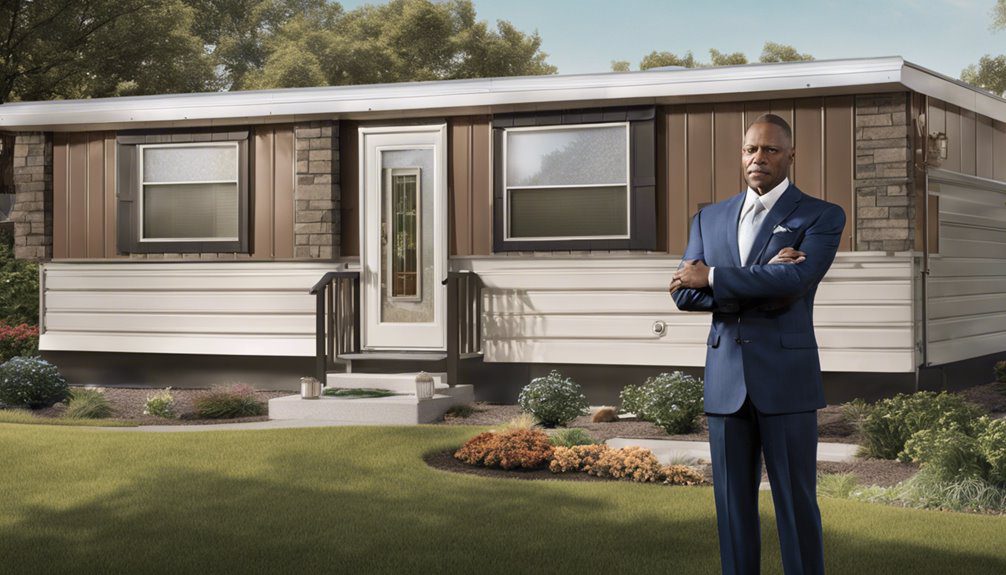If you're considering entering the manufactured home retail business in South Carolina, you'll need to understand the importance of the $30,000 bond. This financial commitment not only ensures that you comply with state regulations but also protects your customers from potential pitfalls. You might wonder how this bond can impact your operations and reputation in the market. As you explore the details, you'll find that there's more to this bond than meets the eye, and understanding its nuances could be crucial for your success.
Understanding the ,000 Bond

Typically, a manufactured home retail dealer bond is set at $30,000, and understanding its purpose is crucial for anyone in the business. This bond serves as a financial guarantee that you'll comply with state laws and regulations governing the sale of manufactured homes. If you fail to meet these obligations, a consumer or another party can file a claim against your bond to seek compensation for damages or losses incurred.
You'll need to obtain this bond before you can operate as a licensed dealer, and it's essential to know that the bond amount can vary by state, but $30,000 is the standard in many areas. To get this bond, you'll likely undergo a background check and provide financial information, which helps determine your eligibility and the premium you'll pay. Additionally, compliance with consumer protection laws is vital to avoid claims and maintain your reputation in the industry.
Once secured, it's important to keep the bond active and renewed according to state requirements. Not only does this bond protect your customers, but it also enhances your credibility in the marketplace.
Purpose of the Bond
The primary purpose of a manufactured home retail dealer bond is to protect consumers and ensure compliance with state regulations. This bond acts as a financial safety net that guarantees you'll adhere to the laws governing the sale of manufactured homes. If you fail to meet these obligations, the bond provides a way for consumers to seek compensation for any losses they may incur.
By obtaining this bond, you demonstrate your commitment to ethical business practices and consumer protection. It reassures potential buyers that you're a trustworthy dealer who follows all legal requirements. This not only boosts your reputation but also enhances customer confidence in your operations.
Furthermore, the bond serves as a deterrent against fraudulent activities and misconduct. Knowing that there are financial repercussions for violating regulations encourages you to conduct your business in a responsible manner. Additionally, the bond ensures that you pay necessary taxes and fees accurately and timely, providing recourse for consumers to seek compensation for financial losses.
In essence, the bond helps maintain industry integrity and promotes fair dealings in the market.
Who Needs the Bond?

A wide range of individuals and businesses need a manufactured home retail dealer bond to operate legally in the industry. If you're a manufactured home retailer, whether you're a small dealer or part of a larger operation, this bond is essential. It demonstrates your commitment to adhering to state regulations and protecting consumers.
You must secure the bond if you're involved in selling, leasing, or renting manufactured homes. This includes not just retail dealers but also their employees who handle transactions.
Even if you're a broker or agent facilitating sales, you may also need to obtain this bond to ensure compliance with legal standards.
Additionally, manufacturers or wholesalers selling directly to consumers often need this bond to guarantee their business practices meet industry requirements. License and permit bonds are designed to hold businesses accountable for adhering to licensing laws.
Application Process Overview
Once you understand who needs a manufactured home retail dealer bond, it's important to grasp the application process.
You'll start by gathering the necessary documentation, which typically includes your business license, identification, and financial statements. These documents help the surety company assess your eligibility and financial stability.
Next, you'll need to complete an application form. This form will ask for details about your business, including its structure, location, and ownership. Be prepared to provide information about your experience in the manufactured home industry, as this can influence the approval process.
After you submit your application, the surety company will review it, often conducting a credit check. This step is crucial because your credit score can impact the bond's terms.
If everything checks out, the company will issue a bond quote based on their findings. Additionally, you may need to demonstrate financial stability to ensure a smoother approval process.
Once you accept the quote, you'll pay the premium and receive your bond. It's essential to keep a copy for your records.
With the bond in hand, you can confidently proceed with your business operations, knowing you're compliant with state regulations.
Bond Costs and Fees

Understanding bond costs and fees is crucial for budgeting your business expenses. The cost of a manufactured home retail dealer bond typically varies based on a few key factors, including your credit score and the overall financial health of your business.
Generally, you can expect to pay a percentage of the total bond amount, which in this case is $30,000. This percentage usually ranges from 1% to 10%, depending on those factors.
For example, if you have good credit, your premium could be closer to 1%, costing you around $300 annually. However, if your credit isn't as strong, the premium might rise to 10%, resulting in an annual cost of $3,000.
In addition to the premium, you should also consider other potential fees. These might include application fees, renewal fees, or additional documentation costs. Understanding the eligibility and qualification criteria is essential for ensuring you meet the requirements before applying for the bond.
Always clarify these details with your bond provider to avoid surprises down the line. By understanding these costs upfront, you can make informed decisions and ensure your business stays compliant and financially sound.
Required Documentation
When applying for a manufactured home retail dealer bond, you'll need to gather specific documentation to support your application.
First, prepare a completed application form provided by your bonding company. This form typically requires basic information about your business, including your legal name, address, and type of ownership.
Next, you'll need to provide proof of your business registration. This could be a copy of your business license or articles of incorporation, showing that you're legally allowed to operate in your state.
Additionally, financial statements, such as a balance sheet or profit and loss statement, may be required to demonstrate your business's financial stability.
You'll also need to include personal information, like a Social Security number and a personal financial statement for all business owners. This helps the bonding company assess your creditworthiness.
If applicable, provide any relevant experience in the manufactured home industry, which can strengthen your application.
Lastly, be prepared to pay the bond premium or any associated fees.
Once you've gathered all the necessary documentation, you can submit your application and begin the process of securing your bond.
Renewal and Maintenance

Renewing and maintaining your manufactured home retail dealer bond is essential for staying compliant and protecting your business. To ensure your bond remains valid, you'll need to keep track of its expiration date. Most bonds are issued for a year, so set a reminder a few months in advance to begin the renewal process.
When it's time to renew, you'll typically need to complete an application and pay the renewal premium. Depending on the surety company, you might also need to provide updated financial information or documentation to show that your business is still in good standing.
To maintain your bond, it's crucial to avoid any violations that could lead to claims against it. Stay informed about industry regulations and ensure you're adhering to all state laws related to manufactured home sales. This proactive approach not only helps in maintaining your bond but also fosters trust with your customers and partners.
Lastly, keep open communication with your surety provider. They can offer guidance on any changes that might affect your bond and assist you throughout the renewal process. By staying on top of these aspects, you'll secure your business's future effectively. Additionally, being aware of the Illinois Department of Financial and Professional Regulation can provide valuable resources and updates on compliance requirements.
Impact on Consumers
The health of your manufactured home retail dealer bond doesn't just impact your business; it also plays a significant role in consumer protection. When you maintain a valid bond, it assures your customers that you're committed to ethical practices and compliance with industry standards.
This bond acts as a safety net for consumers, helping to protect them from potential financial losses due to fraud, misrepresentation, or failure to deliver on promises. If a problem arises—like a defective home or unmet contractual obligations—your bond provides a way for consumers to seek compensation.
This reassurance builds trust between you and your customers, encouraging them to choose your dealership over competitors. When consumers know they're protected, they're more likely to make a purchase, which can ultimately boost your sales.
Moreover, a solid bond reflects positively on your reputation. It signals to potential buyers that you're a legitimate dealer who values transparency and fairness. Additionally, having a bond is essential for maintaining regulatory standards, which further enhances your credibility in the marketplace.
In today's marketplace, where trust is essential, maintaining your bond not only safeguards your customers but also enhances your business's credibility and long-term success. This relationship creates a win-win scenario for both you and the consumers you serve.
Common Myths and Misconceptions

Many people hold misconceptions about manufactured home retail dealer bonds that can lead to confusion and misinformation. One common myth is that these bonds act as insurance. In reality, they're a form of surety bond, which means they guarantee that the dealer will adhere to laws and regulations. If a dealer fails to comply, the bond can cover damages up to the bond amount, but it's not insurance for the dealer.
Another misconception is that all dealers need the same bond amount. In South Carolina, the required bond amount is $30,000, but this may differ by state based on local regulations.
Some might think that obtaining a bond is a lengthy process, but it's often straightforward and can be completed quickly with the right information. Additionally, the application process typically involves submitting financial statements and credit history to ensure the dealer meets bonding requirements.
Lastly, many believe that only established dealers need these bonds. However, even new dealers must secure a bond before they can operate legally.
Understanding these facts will help you navigate the world of manufactured home retail dealers more effectively and clear up any confusion surrounding the bond requirement.
Conclusion
In conclusion, the South Carolina $30,000 Manufactured Home Retail Dealer Bond is essential for maintaining trust and compliance in the industry. By securing this bond, you not only protect yourself but also your customers, ensuring they have recourse in case of issues. Remember, this bond isn't just a regulatory requirement; it's a commitment to ethical practices that can enhance your reputation and build lasting relationships with consumers. Don't overlook the importance of this financial safeguard!


